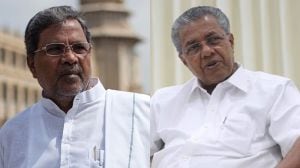Sonia8217;s sharpshooter
As moves were being made to instal Sonia Gandhi as prime minister last week, Congressmen were clear about one thing. If she made it, Arju...

As moves were being made to instal Sonia Gandhi as prime minister last week, Congressmen were clear about one thing. If she made it, Arjun Singh would be the second most powerful person in the new dispensation. Some even thought he may become the de facto Prime Minister, given Sonia8217;s inexperience. But if she didn8217;t make it, they felt, the knives would be out for him.
The man who could not win the last two successive Lok Sabha elections from his own home state, a state he had reigned over as chief minister twice; the man who was instrumental in launching the breakaway Tewari Congress has managed to bounce back to the centrestage of Congress politics.
Singh has always been a survivor. Two days after he took over as chief minister for the second time in Madhya Pradesh in 1985, Rajiv Gandhi sent him to Punjab as governor to help revive the state from the mess it found itself after Bhindranwale and Bluestar. Within months Arjun Singh had won over Longowal and had the Punjab Accord in the bag.
With that hewas back in the reckoning. Winning the Lok Sabha elections from south Delhi, he was appointed union minister for commerce. But not for long. Rajiv Gandhi removed him and made him vice-president of the party.
More recently, the wily Thakur has been the Congress8217; main negotiator with the opposition parties. It now transpires that he erred in regarding 8220;opposition parties8221; as being synonymous with CPI-M8217;s Harkishen Singh Surjeet. In the last stages, Sonia Gandhi took over that role herself and was in direct touch, not just with Jayalalitha, but with one or two member groups. Though Sonia Gandhi had set up a core group of senior leaders to negotiate the way, 8220;Operation Sari8221;, as the move by Jayalalitha and Sonia is called in political circles, was put into operation essentially by Arjun Singh, M.L. Fotedar, Vincent George and R.D. Pradhan. They were christened the Gang of Four by Congressmen.
Arjun Singh naturally come to acquire a central position within the gang8217;. After all, ever since Sonia Gandhitook over as Congress chief, it was he who had advised her on political matters. Known as the karta dharta doer of the chief8217;s affairs, he was the only 8220;authorised8221; spokesperson of the party after leaders like Salman Khurshid, Kamal Nath and Anil Shastri began to speak to the electronic media about Congress thinking and strategy.
Even before it became clear that Sonia could muster the right numbers, draft lists of the Union Cabinet were doing the rounds. Not surprisingly, Singh was projected as home minister. There was speculation that he would contest one of the two vacant Lok Sabha seats in Rajasthan and Sonia Gandhi the other, and that Ashok Gehlot had been sounded about this.
It was not long ago that Singh was put in charge of the minority cell of the AICC by Sonia Gandhi. To head a department that comes under the charge of an AICC general secretary must have been galling for a leader, who, in his time, was Number Two in the government and in the party. But before long he had used the VishnuBhagwat affair to become indispensable to Sonia Gandhi by creating an impression in 10, Janpath that Sharad Pawar was soft on the former Navy chief and did not want a vote in the House on the issue.
Singh8217;s survival strategies were honed in his early years as politician. They can be summed up in the saying nripam seviyam, chakram seviyam, na seviyam kewal nripam you have to serve not only the king but the circle that surrounds him. He has had a long association with Vincent George, secretary to Rajiv Gandhi and then to Sonia Gandhi, and has been known to spend hours with him.
This access and the secular card have been the core of his politics since Rajiv Gandhi8217;s death in 1991. He first attacked Narasimha Rao for ignoring Rajiv loyalists to gain Sonia Gandhi8217;s sympathy. The tension between Rao and Singh began when the former 8212; who had made Singh leader of the Lok Sabha on becoming prime minister 8212; did not support him once he was himself elected to the Lok Sabha. Arjun Singh had apparently feltunfairly treated. After all, didn8217;t Jawaharlal Nehru allow Sardar Patel to be leader of the Lower House in similar circumstances?
Later, he espoused causes close to Sonia Gandhi8217;s heart, like the Jain Commission report. Many feel that Sonia Gandhi has gone out of her way to accommodate Singh because she felt he had suffered on her account first, by resigning from the Union Cabinet in December 1994 because the Rao government was not doing enough to punish the killers of Rajiv Gandhi and later for forming the Tewari Congress at her behest.
Singh is known to be precise in his words and meticulous in the homework he does. But this time round, he seems to have faltered in his role as chief political advisor to Sonia Gandhi. Surjeet is believed to have assured Sonia Gandhi that he would bring the entire secular family around to support her from the outside. It is okay for Sonia to have gone along with this, but Singh should have been wiser. In the process, Sonia Gandhi has exposed herself having given up hermain weapon 8212; her reluctance and renunciation which has gone down so well with people 8212; and come across as any other politician eager to grasp power.
Singh has had his eyes on the hot seat in Delhi since Rajiv Gandhi8217;s death. With Pawar and Pranab Mukherji, he is among the seniormost leaders in the party. But unlike Pawar he no longer has a mass base in Madhya Pradesh. His attempt to win the 1998 Lok Sabha election by moving his constituency from Satna, which he lost in 1996, to Hoshangabad was not successful. His own chela, Digivijay Singh, who is also related to him, has ensured that he does not bounce back in state politics.
History did provide him with a moment when he could have struck. If he had resigned on the day the Babri Masjid was demolished, both Arjun Singh8217;s story and that of the Congress would have been a different one. But Singh, who began his political career as an independent MLA and later joined the Cabinet of D.P. Mishra, was too steeped in the Congress culture to take on his leaderdirectly. He made his moves against Rao but without coming up front. It was M.L. Fotedar, not Singh, who took Rao to task at the Cabinet meeting on December 6, 1992.
The problem with Singh is that he keeps his counsel and does not exude warmth, even to those he knows well. He is precise with his words and that is why he was made the only authorised spokesman of his party. He is respected for his political acumen and administrative skills and has been able to derive great political advantage through his administrative actions. His decision on tendu leaves in Madhya Pradesh sent a clear signal that he was positioning himself as the champion of the marginalised. As Union HRD minister, he tried to further that image.
Though there are many in the party who will gun for Singh now that the move to install Sonia Gandhi as prime minister has run into trouble, he is too seasoned a player to be wished away.
Even if he finds himself in the doghouse for sometime, he is sure to bounce back. As he has always done.Despite electoral reverses, despite occasionally falling out with the party high command, despite leaving the party. But to ensure a position of strength within the party, he will need to win another election. Ultimately, his future depends on his acceptability with the people.
8211;NEERJA CHOWDHURY
- 01
- 02
- 03
- 04
- 05































